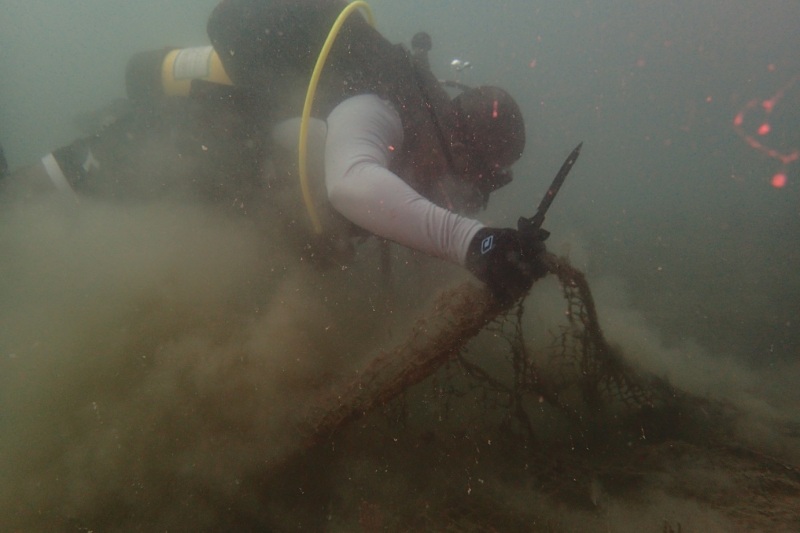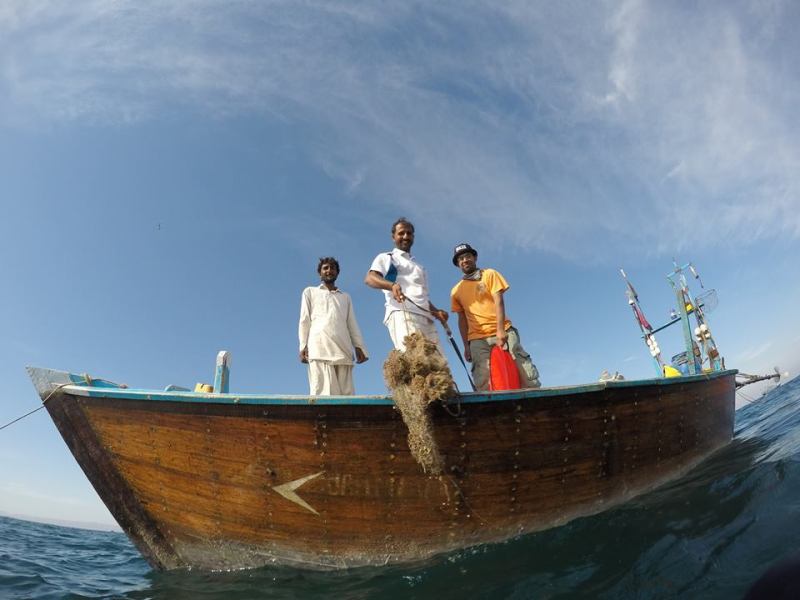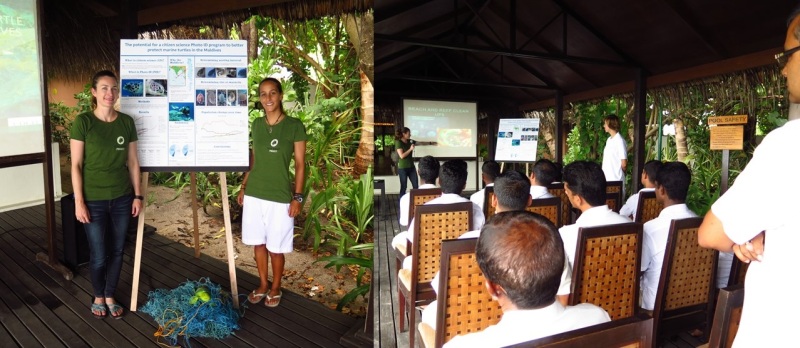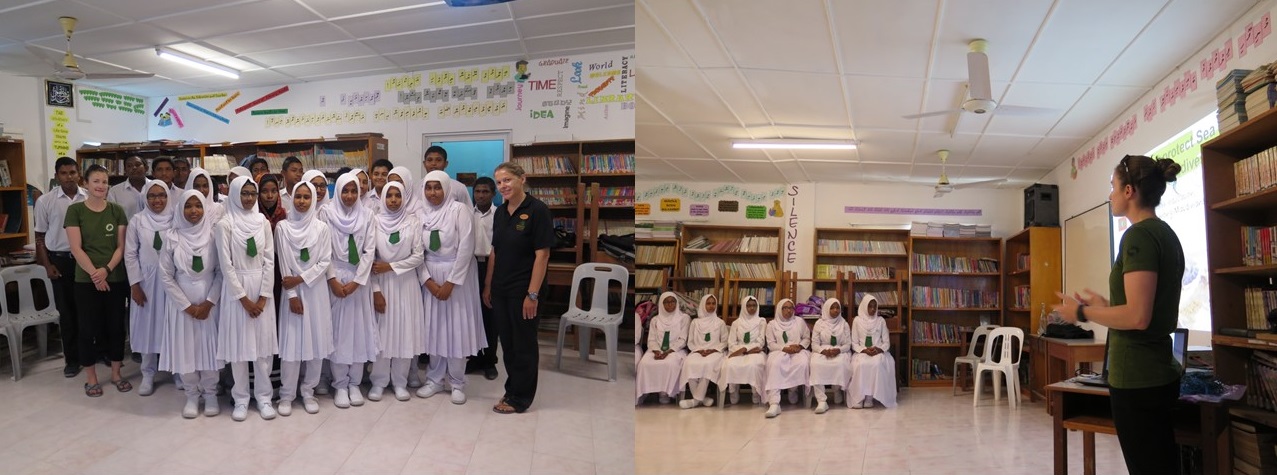The Olive Ridley Project Goes to Oman, Pakistan and The Maldives
May, 11 2016
Here Dr. Jillian Hudgins, ORP project scientist, shares her exciting updates from ORP visits to Oman, Pakistan and the Maldives.
Happy Reading
2016 has been a busy year so far for the Olive Ridley Project. Our UK charity status registration went through, we chaired a workshop and presented posters at the International Sea Turtle Symposium, and we made visits to Oman, Pakistan, and the Maldives!
In February of 2016, ORP’s Indian Ocean journey started in Oman to conduct a pilot survey.
First, we visited Six Senses Zighy Bay where we worked with Extra Divers to remove ghost nets on four clean up dives. We then traveled to Masirah Island with the Environmental Society of Oman (ESO) where we surveyed the beaches for ghost gear. Finally, we traveled to Muscat where we held a public seminar and a government workshop.
Oman has proved a challenging country to work in so far but we are working with ESO and the government in order to tackle the issue of abandoned fishing gear in the region.

Teamwork – Net removal with Six Senses-Extra Divers Zighy Bay
“Olive Ridley Project: Pakistan” was started in late 2015 after ORP director Martin Stelfox made a pilot visit to the country, working in partnership with WWF-Pakistan and the Sindh Wildlife Department.
The initial focus was to promote cooperation between the recreational diving community and the fishing community so that when a fisher loses a net, it can be quickly reported to, and recovered by, divers.

Volunteer Shiraz Ali working hard to remove a ghost net entangled on a local reef in Karachi
The project quickly gained momentum, particularly in the community of Rehman Goth, where we have held four workshops for the community.
Three major players in ORP: Pakistan are ORP community officer, Absar Khan, who has been organizing the workshops and recovery dives; Umair Bin Habib, for his continuous support in the project (especially graphic design and videography); and Asif who is a very well respected fisher in Rehman Goth community. We have also had great assistance from Kashif Ayoub and Shoaib Abdul Razzaque from WWF-Pakistan throughout the project and we are confident that together we can make big improvements in fishing practices throughout Pakistan.

Fisher of Rehman Goth village Asif (middle) and Shoaib Abdul Razzaque from WWF-Pakistan (right) pulling up a ghost net retrieved by divers from a local fishing ground
ORP: Pakistan by the numbers:
73 ghost nets removed
35 cement bags full of ghost gear collected
10 recovery dives
4 community workshops
3 turtles rescued
12 km of green turtle nesting beach cleaned (20% of the trash found was ghost gear!)
ORP: Pakistan’s next steps are
1) Develop centralized collection points for nets,
2) Look at options for recycling and reusing the nets in-country, and
3) Develop a fisher education program that will eventually expand to other communities.
In April of 2016, I visited Coco Collection, our partner in the Maldives. My first visit was to Coco Bodu Hithi.
Resident Marine Biologist Lisa, Marine Biology Intern Lucía and I teamed up to engage the associates of Coco Bodu Hithi in an informative session on sea turtles and ghost nets. During the training session, I shared important findings by Coco Collection’s former Resident Marine Biologist Chiara Fumagalli. The results were displayed on a poster, which I presented earlier this year at the International Sea Turtle Symposium in Peru.

Presenting latest sea turtle findings from Coco Bodu Hithi and training associates
On the following day, associates had the chance to look for sea turtles and one of their biggest threats: ghost nets. Luckily, we found more Hawksbill sea turtles than ghost nets, which everyone agreed on, was the best outcome for our mission.
It is always a delight to swim with the resident Hakwksbill sea turtles at Bodu Hithi Turtle Point! This time, the lovely SENGE (HK1075) accompanied me.

Coco Bodu Hithi associates joining Dr. Jillian Hudgins for a ghost net removal mission
In 2016, Coco Bodu Hithi and Coco Privé associates have found and removed 8 ghost nets already, and rescued one Olive Ridley sea turtle! A huge Thanks to the Marine Biology Team and associates, it is indeed wonderful to see such a well-trained team at Coco Bodu Hithi who choose to be part of the solution rather than the problem.

Coco Privé associate Rasheed removing a huge ghost net from Bodu Hithi sandbank
Coco Palm Dhuni Kolhu I visited next, where I was greeted by Resident Marine Biologist Tina and her team.
Similar to Coco Bodu Hithi, associates gathered for an awareness talk on ghost nets and training on helping entangled sea turtles .With their fresh knowledge in mind, they went out on the House Reef in search for ghost nets. To everyone’s relieve and surprise, we encountered one Hawksbill and two Green sea turtles instead of ghost nets!
The day after, Tina and I visited a school on the neighbouring island Thulhadhoo. Students and teachers alike learned about the biology, lifecycle and threats of marine sea turtles. As one of the threats to sea turtles poses floating trash, I also referred about the importance of waste management.
Immediately, theory was followed by initiative: Students could show what they had learned by cleaning up their own island, separating and recycling the collected waste.

Students from Thulhadhoo school learning about sea turtles and waste management
As a successful conclusion to my stay at Coco Palm Dhuni Kolhu, guests followed the invitation to join a special snorkelling excursion to Muthaafushi House Reef.
Swimming with wild but friendly Hawksbill sea turtles in their natural habitat during your holiday, what more can you wish for?

Resident Hawksbill sea turtle HK984 PRIYA BROWN feeding on carpet sea anemones
One of the major obstacles when it comes to tackling the ghost gear problem is that, although it is a global issue, there is no one solution that can be replicated on a world-wide scale. Each country and region presents its own challenges whether it is resistance from the fishing community, lack of resources on the part of the government, or lack of disposal infrastructure.
ORP is proud of the progress we have made in 2016 and the donations we receive through Coco Collection help to make these projects a reality!